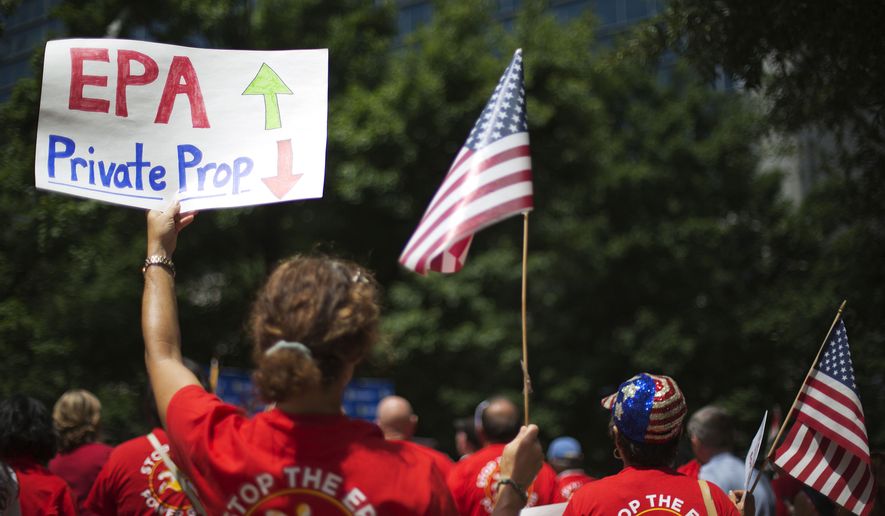President Obama’s power plant regulations will move ahead after a federal court Tuesday threw out challenges to the controversial plan and dealt a serious blow to lawmakers, the fossil fuels industry and others trying desperately to halt the administration’s climate change agenda.
The U.S. Court of Appeals for the District of Columbia dismissed lawsuits brought by a coalition of states and energy companies, saying it was too soon to rule on the Environmental Protection Agency’s so-called “Clean Power Plan,” which is expected to be finalized this summer. The plaintiffs — who vowed to file new legal challenges later this summer — argued the plan, which would limit carbon emissions from existing power plants, is so onerous it required judicial intervention even before the final regulations are released. The lawsuits also charged that the EPA was overstepping its bounds under the federal Clean Air Act.
The court said it is too soon to rule on the merits of the case, clearing the way at least temporarily for the central piece of Mr. Obama’s ambitious climate-change agenda to go into effect.
“They want us to do something that they candidly acknowledge we have never done before,” Judge Brett Kavanaugh wrote in his opinion. “We do not have authority to review proposed agency rules.”
The highly anticipated decision came one day after Mr. Obama returned from a G-7 summit in Germany, where world leaders vowed to cut global greenhouse gas emissions by at least 40 percent by 2050 and ween the planet off of fossil fuels this century.
The president also has pledged that the U.S. will cut its overall emissions by at least 26 percent by 2030 and will seek similar commitments from other countries at a key United Nations climate change meeting later this year in Paris.
SEE ALSO: Obama, G-7 commit to ‘decarbonisation’ of global economy this century
The EPA’s carbon regulations are vital to achieving Mr. Obama’s broader goal. Administration officials have denied claims that the plan will drive up electricity rates, kill jobs and wound the U.S. energy sector.
On a conference call with business leaders, EPA Administrator Gina McCarthy said the regulations could result in a small rise in electricity rates over the short term, but by 2030 consumers will enjoy an 8 percent reduction in those rates.
“Not all carbon-reduction strategies actually cost money,” she said.
The administration admits that the Clean Power Plan will drastically reduce coal use in the U.S. over the next 15 years. Coal currently generates nearly 40 percent of the nation’s power.
If the EPA regulations go into effect, that figure will drop to at least 30 percent by 2030, the agency predicts.
While the EPA plan survived its first test in court, opponents vowed to press ahead. They say they’ll file new lawsuits after the agency releases the final version of the regulations this summer.
SEE ALSO: IRS can’t verify qualifications of every Obamacare subsidy recipient, watchdog says
“We are obviously disappointed with the court’s ruling today, but we still think we have a compelling case that the rule is unlawful,” said West Virginia Attorney General Patrick Morrisey, who argued the case before the circuit court earlier this year. “As the court recognized, the rule will be final very soon, and we look forward to continuing to press the issue. We will continue to take every available step to protect our citizens and the state of West Virginia from this unlawful power grab by Washington bureaucrats.”
West Virginia and nearly a dozen other states brought one legal challenge to the EPA plan. The other came from Ohio-based Murray Energy. The two lawsuits were consolidated in the district court case.
Because the district court ruled only on the timing of the lawsuits and not the merits of the case, specialists say it’s still entirely possible the rules ultimately are scrapped.
“The court did not tip its hand regarding the merits of the petitioners’ challenge to the rule, which was based on the argument that EPA lacks the authority to issue the Clean Power Plan. If the rule is promulgated in August, as expected, opponents of the Clean Power Plan will immediately have the opportunity to test their argument again and seek a stay of the regulation,” said Will Yeatman, a senior fellow at the Competitive Enterprise Institute.
• Ben Wolfgang can be reached at bwolfgang@washingtontimes.com.




Please read our comment policy before commenting.